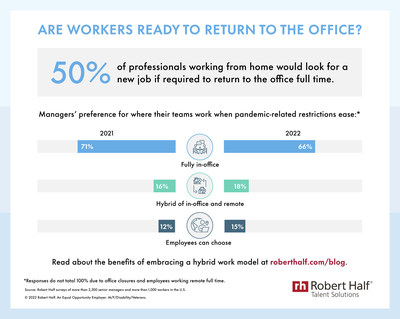Professional firms considering returning to pre-pandemic office protocols had better learn to be flexible, or they may risk losing experienced staff.
After two years of uncertainty, many companies are eager to call employees back to the office for good, new research from talent solutions and business consulting firm Robert Half shows.
In a survey of more than 2,300 senior managers in the U.S., two-thirds of respondents (66%) said they want their teams to work on-site full time as COVID-19-related restrictions ease. This is down five points from a similar survey conducted last year, suggesting some companies have warmed up to the idea of flexible work.
Click for larger infographic.
Currently, only 1 in 3 senior managers support long-term hybrid schedules (where staff can divide time between the office and another location) and employees’ ability to choose where they work. Those in technology (37%) are most open to flexibility.
The Risk of an Employee Exodus
Return-to-office plans may lead to more resignations, separate research from Robert Half shows. In a survey of more than 1,000 professionals, half of respondents currently working from home (50%) would look for a new job that offers remote options if their company required employees to return to the office full time, up 16 points from one year ago. Working parents (55%) and millennial professionals (65%) are mostly likely to quit if called back.
A separate survey from Willis Towers Watson found worker dissatisfaction overall, with 53% of employees being open to leaving their employers and 44% saying they had actively searched for a new job in the fourth quarter of 2021.
Hybrid work models give employers and employees flexibility and choice and are the way forward.
“Employers may be holding onto the idea that the office is the best place to collaborate, innovate and get things done — but workers feel otherwise,” said Robert Half senior executive director Paul McDonald. “Companies already face retention challenges, and taking away remote options will only exacerbate the problem. Hybrid work models give employers and employees flexibility and choice and are the way forward.”
How to Embrace a Flexible Work Model
Companies may want to adopt a long-term hybrid work model but not know where to start. Trisha Plovie, senior vice president of future of work at Robert Half, offers five questions to help guide the process
- How will you define “hybrid”? Will employees be required to come to the office certain days each week or only for specific purposes, such as trainings or team building?
- How can you improve your onboarding experience? As you hire remote employees, consider how you will make them feel welcome, supported and part of a team they might never meet in person.
- Do you have the right technology to support effective communication and collaboration? Consider what new tools to implement to create a seamless experience for onsite and remote staff.
- What business processes will be impacted? Anticipate problems, adjust workflows and ensure everyone has access to the resources they need.
- How will you build and maintain engagement and morale? Create equal opportunities for all employees to grow and develop, network, and build authentic relationships with colleagues.
Read more about the benefits of embracing a hybrid work model on the Robert Half blog.
The online surveys were developed by Robert Half and conducted by independent research firms. They include responses from more than 2,300 senior managers in finance, technology, marketing, legal, administrative and customer support, human resources, and other areas at companies with 20 or more employees (collected November 11 to December 30, 2021), and more than 1,000 workers 18 years of age or older (collected March 3-11, 2022) in the U.S.
Thanks for reading CPA Practice Advisor!
Subscribe Already registered? Log In
Need more information? Read the FAQs
Tags: Benefits





